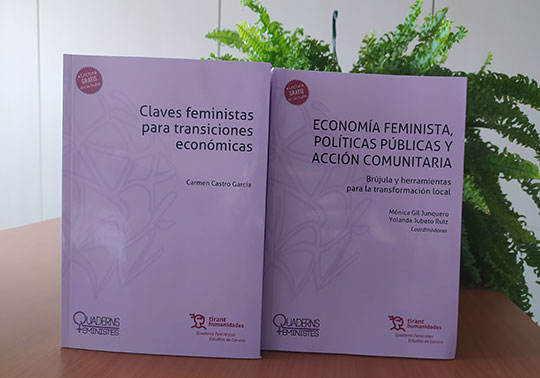
The Quaderns Feministes Collection of the Chair for Feminist Economics and the Institute of Women's Studies of the Universitat de València, published by the Tirant lo Blanch publishing house, has two new publications.
The first of these is entitled "Economía feminista, políticas públicas y acción comunitaria. Brújula y herramientas para la transformación Local" [Feminist economics, public policies and community action. Compass and tools for local transformation] and has been coordinated by Mònica Gil and Yolanda Jubeto. The publication reflects on and explores the potential of municipal public policies, as well as the essential community action, in the construction of other socio-economic and cultural models that place the sustainability of life at the centre and that escape from capitalist, patriarchal and colonial logics. Within this framework, different municipal public policies are addressed, such as public budgets, resources and uses of space and equality policies, as well as different community actions impregnated with the principles of feminist economics. The publication combines theoretical content with practical experiences that are being developed in municipalities in Spain. The authors are people directly involved in the corresponding processes, and their direct and situated knowledge of the issues analysed is particularly valued.
The second publication, written by Carmen Castro, is entitled " Claves feministas para transiciones económicas" [Feminist Keys to Economic Transitions]. Women's freedom is guaranteed with full economic rights, something difficult to imagine in the current paradigm of inequality and the sexual division of labour. This book speaks of the need to move towards other economies, paying attention to the everyday reality and living conditions of women, recognising their contributions that are often overlooked in the narrative of conventional economic thinking and identifying the mechanisms of inequality that persist in the current social and economic organisation of time, work and income. The author poses fifty questions which, taken together, show the need to construct a new economic thinking and practice. There are no recipes in her answers, although it is possible to find clues and perspectives towards another model of society, based on human equivalence and distributive justice. It conveys a direct invitation to act and lead this change, articulating a new social pact that identifies people in their fragility and interdependence of life, in their relational autonomy and eco-dependence.
- Access to the website of the Chair of Feminist Economics


